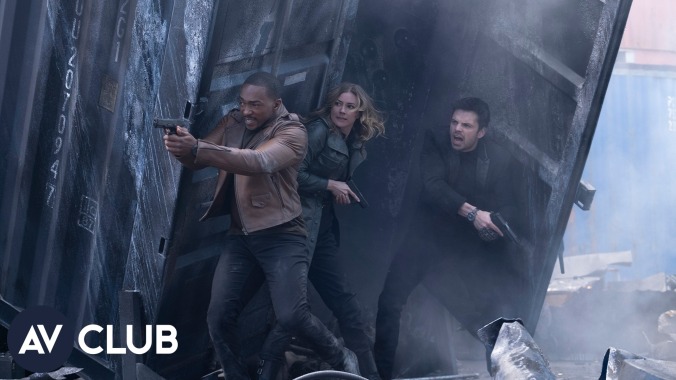The Falcon And The Winter Soldier consciously dialed back its gunplay
With The Falcon And The Winter Soldier’s launch Friday on Disney+, the viewing public has once again been reacquainted with our old pals Sam Wilson and Bucky Barnes. With a first episode that offers a lot of table setting for what’s to come, The Falcon And The Winter Soldier promises to be a whiz-bang, smash-’em-up six parter, as well as a surprisingly deep and emotional look at what it truly means to be Captain America. To get a better sense of how the show came together, we sat down with the director of all six episodes, Kari Skogland, to talk about Bucky Barnes’ time in therapy, being a woman working in “a muscular space,” and why she thinks there’s too much gunplay in entertainment.
The A.V. Club: Wandavision was a huge success for Disney+ in terms of fan involvement with the show. Has that put pressure on you in terms of expectations? I actually talked to [showrunner] Jac Schaeffer from Wandavision about this, but can you please everybody all the time when it comes to a Marvel project?
Kari Skogland: I’m sure we can’t. I’m just trying to stay true to the story that we’re telling.
Wandavision came out of the gate swinging, and that’s fantastic. I was thrilled for them because it’s such a creative show and so unique and different. It couldn’t have opened the whole Disney streaming thing for Marvel better, as far as I can tell. They set the bar high, though, and how exciting is that for us?
I hope the fans embrace our show. We love making this show. We’re very, very proud of it. I hope the fans embrace it as much as we love making it. I’m sure [Jac] would say the same. I just hope our fans are as engaged.
It’s spectacular that the fan base is so invested in these characters and is so interested. I think it is extraordinary.
AVC: I’ve heard the show compared to a buddy action-comedy, and some previews have mentioned that it’s reminiscent of some beloved action movies. Did you guys watch anything in reference? What was on your mood board?
KS: That’s a great way to put it. The way I try to get inspiration and ideas and such is from a very, very wide swath of different genres, even if I’m looking at a particular execution, mostly because I want it to have some originality. I wanted the show to have not just my personal voice, but also to embrace other ideas that I can bring into the genre. So it’s all about feeding those synapses and stirring the pot and coming out with something that’s hopefully original.


 Keep scrolling for more great stories from A.V. Club.
Keep scrolling for more great stories from A.V. Club.